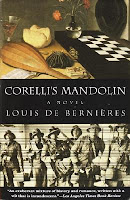 When I bought my second-hand copy of Drop City by TC Boyle, I knew nothing about the book except for the fact that it’s on the 1001 Books list. My copy cost $3.99 and I bought from a now-defunct bookstore in Stratford, Ontario one snowy winter day my RRHB and I were out exploring my Irish roots in Millbank, Ontario. It was a great day. Then, like so many of my books, it sat on the shelf, and sat on the shelf, and sat on the shelf.
When I bought my second-hand copy of Drop City by TC Boyle, I knew nothing about the book except for the fact that it’s on the 1001 Books list. My copy cost $3.99 and I bought from a now-defunct bookstore in Stratford, Ontario one snowy winter day my RRHB and I were out exploring my Irish roots in Millbank, Ontario. It was a great day. Then, like so many of my books, it sat on the shelf, and sat on the shelf, and sat on the shelf.
But once I started this book I resented anything taking time away from the reading of it. Drop City provides a refuge for anyone who wants to drop of out of society. A commune on an idyllic plot of land in California where hippies of all sorts call home, Drop City’s inhabitants don’t go for the Man’s version of how they should live their lives. But when he comes calling in the form of an injunction (coupled with some back taxes and compounded by more than one run in with the law), their fearless leader decides that the only free place left on earth is Alaska, and “Let’s go!”
Interspersed within the story of the caravan of hippies abandoning their commune (complete with a few goats strapped to the top of a merry-making old bus), is the other side of “dropping out.” The very real people who already make a life in Alaska by truly living off the land. There are benefits to both ways of life, but to say that the hippies are prepared for the harsh Alaska winter would be an understatement.
Ronnie (aka “Pan”) and Star had travelled across the USA to get to Drop City. They abandoned their education and their livelihoods (she was a teacher) for a chance to live a real life among truly free people. And they do find free love and a free life, if only for a fleeting moment before the reality of life, and their disparate personalities gets in the way of their idealism. Star’s soon left Ronnie behind for Marco, a violent drop out who is on the run from the law and from his entire identity (it seems), who represents a different kind of life and love for her by the time the novel reaches its conclusions.
Interspersed with the idealistic, even indiotic (at times), hippies, are the real societal “drop outs.” The people who live on the cold, permafrost borders of Alaska hunting, trapping and camping in cold wooden houses not meant for much more than a temporary stop along the way. The dramatic difference, not necessarily in idealism, but in common sense, between the Drop City band of ragtag, Ken Kesey-like bus people and the actual Alaskan settlers causes the necessary friction the book needs.
I can’t stress enough how engrossing this novel is from beginning to end. It’s one of those books whose narrative drives along at such a breakneck speed that you barely even register the fact that you’ve already read 150 pages, the sun’s gone down and you’re fingers are freezing from holding the book so tight. T.C. Boyle has a way of slowly building steam that will eventually boil, both within characters and situations, that overshadows the entire work with a sense of forboding. This isn’t a bad thing — it’s more that the novel knows its outcome already and you, as the reader, need to catch up as quickly as possible. Parts of this novel just made me cringe too — the idea of free love equalling the utter objectification of some of the women, that the mother among the bunch openly gives her children acid to prove they’re “turned on,” and the asumption that you can simply head to Alaska with little more than the goats on top of your broken down bus and expect to survive, all of which add to the dramatic tension of the most basic themes found in literature: humanity versus their environment.
I know I say this a lot but the 1001 Books list hasn’t let me down with Drop City. I’d highly recommend it. I’d loan you my copy, but I’m sending it to a friend as we speak.








